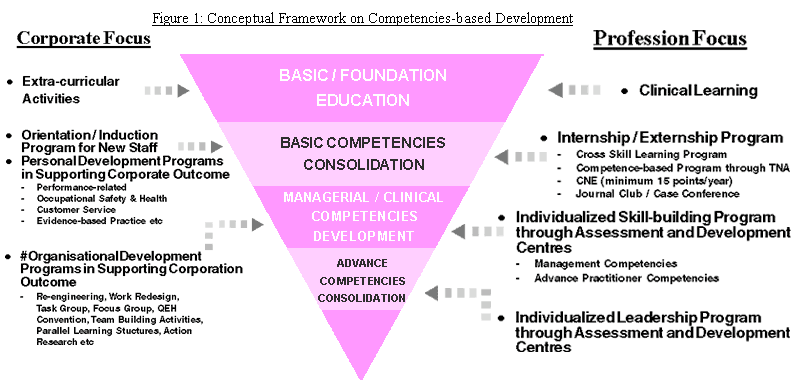
Remarks: #Organisation Development Programs refer to a planned change process to improve organisation effectiveness.
(Derived by Ms. Alice TSO, GM(N), Queen Elizabeth Hospital in 1999; Revised in 2001)
Continuing Nursing Education - Perspectives of Queen Elizabeth Hospital
As a continuation of our theme for the last Issue on continuing nursing education, we are fortunate to have the permission of Ms. Alice Tso, General Manager (Nursing) of the Queen Elizabeth Hospital (QEH), to cite her views, and her Hospital’s future directions for continuing nursing education as published in its Training Prospectus of Continuing Nursing Education, 2001-2003. These are quoted as follows:
"Messages from Ms Alice TSO
General Manager (Nursing), Queen Elizabeth Hospital
Continuing nursing education (CNE) has been seen as a vehicle for nurses to respond to rapid changes in health care delivery and to raise professional standards of current practice. In such an acute and prestigious hospital as ours, CNE is extremely important because the process itself can bring satisfaction to our staff and motivate their continued learning and application to their work so as to uphold our standard and quality of service.
Commitment to nursing needs to encompass not only approaches to patient care, but also approaches to continuing nursing education. The implied benefit of a continuing education requirement is that it will improve one's ability to provide patient care, but this educational requirement can also improve one as an individual as well. Increasing one' knowledge base can make one more aware of and responsive to the needs of patients, the profession, and self. The resulting satisfaction in meeting these needs can promote growth as an individual and increase the satisfaction that nursing can bring.
With the changing health care environment in Hong Kong, CNE must plan for a new paradigm for the future. New program topics for course development can be the preparation of nurses in primary care and community-base nursing, as well as for the independent learning and on-line courses. The future of CNE will be focused on the use of expanding technologies in new and creative educational designs that continue to meet the highest standards for continuing education and design of education activities.
To achieve the targets "Do better with less" and achieve the difficult targets with limited time, every nurse in our hospital must commit to comply with the CNE policy and accept that life long learning is paramount. With their keen pursuit, we hope that they would take the lead to develop more expertise of nursing in helping our patients and community."
"Future Direction
Central Nursing Division, in partnership with clinical departments and external training institutes, offers a wide variety of learning programs for our nurses. Some of these programs are being accredited by renowned professional bodies. It features the commitment of both the management and clinical staff to ensuring the quality of patient care delivery. In the years to come, we will further strengthen our services with the engagement of the Competence-based Development Conceptual Framework (Figure 1) which can merge the existing and the new activities into a coherent pattern with explicit address to the needs of the individual, the profession and the organization. Developing clinical specialty nursing programs and exploring an alternate mode of CNE are the two major directions we are going to pursue. The rise of clinical specialties and sub-specialties coupled with the advancement of medical and nursing technology demand nurses to equip themselves with additional skills and knowledge. Organizing clinical specialty nursing courses will definitely benefit clinical nurses in providing quality patient care. On-line learning facilitates the self-reliance and self-determination of learners."

Remarks: #Organisation Development
Programs refer to a planned change process to improve organisation effectiveness.
(Derived by Ms. Alice TSO, GM(N), Queen Elizabeth Hospital in 1999; Revised
in 2001)